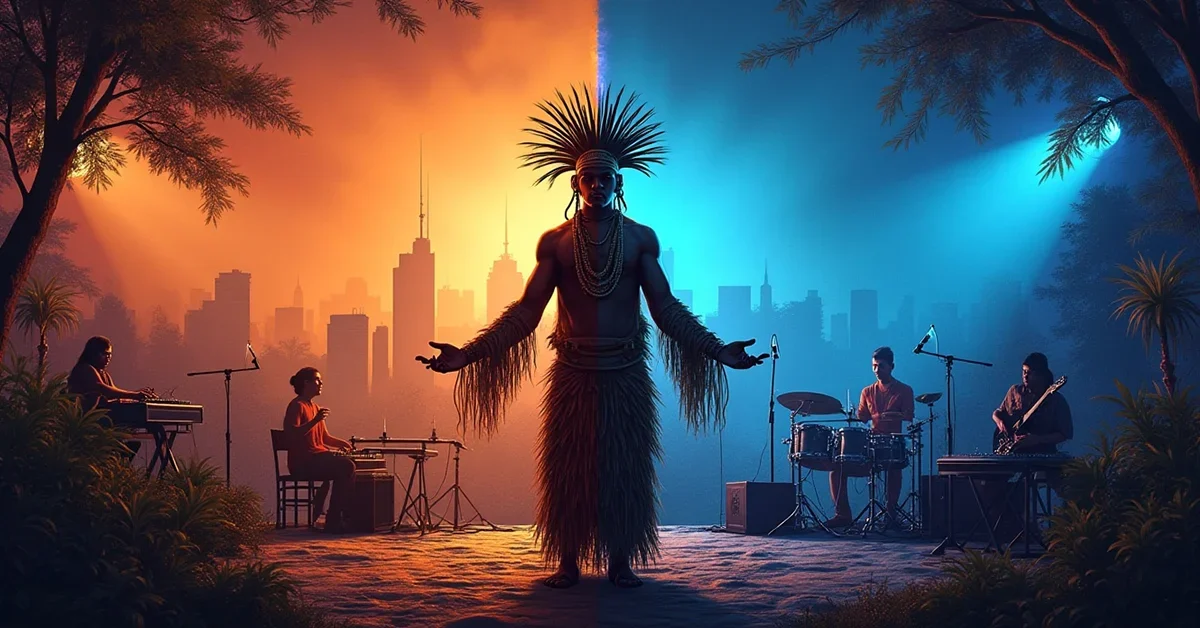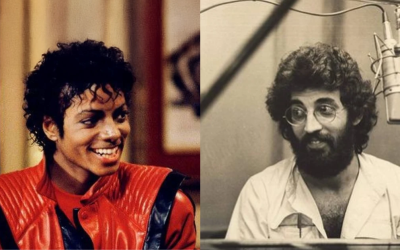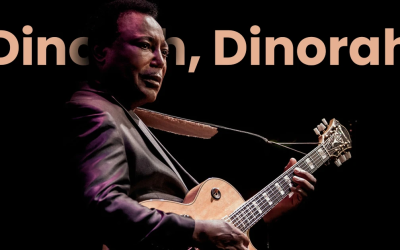Brazil’s musical landscape is as diverse as its ecosystems, with a rich tapestry woven from centuries of cultural fusion. Among the most compelling threads are the contributions of modern indigenous Brazilian musicians who are blending ancestral sounds with contemporary genres. These artists are not only preserving their heritage but also innovating and sharing their unique perspectives with the world.
The Renaissance of Indigenous Music in Contemporary Brazil
Breaking Stereotypes and Building Bridges
For too long, indigenous peoples in Brazil have been relegated to folklore—colorful costumes and ancient legends divorced from modern reality. However, today’s contemporary indigenous music Brazil scene tells a different story. These artists are creating powerful fusions that honor their ancestors while speaking directly to contemporary audiences.
The very existence of indigenous Brazilians today represents what researchers call “a daily act of resistance.” Through their music, these artists transform that resistance into art, education, and cultural bridge-building.
Pioneering Groups Leading the Movement
The Nóg Gã Group: Warriors of Sound
The Nóg Gã Group, formed by the Kaingang people, represents one of the most powerful examples of indigenous music groups Brazil has produced. Their performances infuse traditional music with a warrior spirit that is both ancient and urgently contemporary.
What makes their performances particularly striking is their use of spears as percussion instruments. These aren’t just musical tools—they’re symbols of strength, resistance, and cultural survival. Each beat resonates with the history of a people who have maintained their identity despite centuries of cultural suppression.
Their music demonstrates how native Brazilian music today can honor traditional forms while creating something entirely new and relevant to contemporary audiences.
Teko Guarani Group: Voices of the Future
The Teko Guarani Group represents the intergenerational transmission of indigenous culture in action. This youth choir performs traditional Guarani songs while adding their own contemporary interpretations, showing how Brazilian indigenous artists are ensuring their cultural heritage remains alive and relevant for new generations.
Their performances are more than entertainment—they’re living demonstrations of how oral traditions continue to evolve and adapt. Each song they perform carries forward thousands of years of cultural knowledge while speaking to the experiences of indigenous youth in modern Brazil.
Electronic Music Meets Ancient Traditions
Alok: Bridging Worlds Through Sound
One of the most surprising developments in contemporary indigenous music Brazil comes from an unexpected source: electronic dance music. Alok, one of Brazil’s most renowned DJs and producers, has embarked on a transformative journey with his album “The Future is Ancestral.“
This groundbreaking project features collaborations with artists from eight different indigenous communities across Brazil. What makes this particularly significant is Alok’s commitment to directing all proceeds back to the indigenous communities involved, emphasizing cultural preservation and support rather than appropriation.
The album demonstrates how modern indigenous Brazilian musicians and their allies can create innovative fusions that honor traditional sounds while reaching entirely new audiences through contemporary electronic music platforms.
Folk and Metal Fusion
Arandu Arakuaa: Heavy Metal Meets Indigenous Tradition
Arandu Arakuaa, formed in Brasília, represents one of the most unique approaches to indigenous cultural preservation music. This folk metal band fuses heavy metal with indigenous music, creating a sound that is both powerful and deeply rooted in tradition.
Their lyrics, sung in Tupi and other indigenous languages, delve into myths and rites, offering a powerful blend of modern and traditional elements. The band’s founder, Zândhio Huku, draws inspiration from his upbringing near Xerente territory, ensuring that their music maintains authentic indigenous influences while appealing to metal audiences worldwide.
Preserving Heritage Through Innovation
Gean Ramos Pankararu: Bridging Musical Worlds
Gean Ramos Pankararu, from the Pankararu people, represents the sophisticated fusion approach that characterizes much of today’s Brazilian indigenous artists scene. As a singer-songwriter, he blends traditional indigenous music with popular Brazilian genres including baião, samba, and bossa nova.
With over two decades of career experience and multiple acclaimed albums, Gean demonstrates how native Brazilian music today can honor ancestral sounds while embracing the full spectrum of Brazilian musical tradition. His work shows that indigenous music doesn’t exist in isolation but can engage creatively with all aspects of Brazilian culture.
Marlui Miranda: Research Meets Performance
Marlui Miranda represents the scholarly side of contemporary indigenous music Brazil. As both a performer and researcher, she has dedicated her career to performing and preserving indigenous music from the Amazon region.
Her collaborations with renowned Brazilian musicians and extensive research on indigenous musical traditions have brought these sounds to broader audiences while maintaining their cultural authenticity and significance. Her work demonstrates how indigenous cultural preservation music can thrive through both academic research and popular performance.
Regional Voices and Cultural Roots
Patrícia Bastos: Celebrating Amapá’s Heritage
Patrícia Bastos, from Macapá, incorporates the musical traditions of the Amapá region, including its African and indigenous ancestries, into contemporary musical forms. Her albums have received national recognition for their innovative blending of marabaixo rhythms with contemporary styles.
Her work showcases the rich cultural tapestry of her homeland while demonstrating how modern indigenous Brazilian musicians can celebrate regional diversity within Brazil’s broader indigenous musical landscape.
The Global Impact of Indigenous Brazilian Music
International Recognition and Cultural Exchange
These Brazilian indigenous artists are not just preserving culture—they’re actively shaping global conversations about indigenous rights, environmental protection, and cultural diversity. Their music serves as a bridge between ancient wisdom and contemporary challenges, offering perspectives that are increasingly relevant in our interconnected world.
Through international performances, collaborations, and digital platforms, these artists are ensuring that indigenous music groups Brazil has produced reach audiences worldwide, creating new forms of cultural diplomacy and understanding.
Supporting Indigenous Musical Heritage
How to Engage Respectfully
For those interested in exploring contemporary indigenous music Brazil, consider these approaches:
Active Listening: Approach indigenous music with focused attention rather than as background entertainment. These songs carry cultural weight and spiritual significance that rewards careful listening.
Cultural Context: Learn about the cultural backgrounds and meanings behind the music you’re hearing. Understanding the context enhances appreciation and shows respect for the traditions being shared.
Direct Support: Purchase music directly from indigenous artists when possible, attend their performances, and support organizations working for indigenous rights and cultural preservation.
Educational Engagement: Use indigenous music as a starting point for learning about Brazilian history, environmental issues, and contemporary indigenous experiences.
The Future of Indigenous Music in Brazil
Innovation and Tradition in Harmony
The success of modern indigenous Brazilian musicians demonstrates that cultural preservation doesn’t require cultural stagnation. These artists show how traditional forms can evolve, adapt, and engage with contemporary contexts while maintaining their essential character and significance.
Their work offers hope not just for the survival of indigenous musical traditions but for their continued evolution and global influence. As Brazil and the world face challenges around environmental protection, cultural diversity, and social justice, the voices and perspectives of indigenous musicians become increasingly valuable.
Conclusion: A Living Musical Heritage
Modern indigenous Brazilian musicians represent far more than a musical trend—they embody the resilience, creativity, and ongoing vitality of Brazil’s first peoples. Through their innovative approaches to contemporary indigenous music Brazil, they’re ensuring that ancient traditions remain relevant and powerful in the modern world.
These artists remind us that indigenous culture is not a relic of the past but a living, breathing force that continues to evolve and contribute to Brazil’s cultural landscape. Their music offers windows into worldviews and wisdom that remain urgently relevant as we face contemporary global challenges.
By listening to and supporting these Brazilian indigenous artists, we participate in a form of cultural preservation that honors the past while embracing the future. Their music invites us to expand our understanding of what Brazilian music can be while deepening our appreciation for the rich cultural heritage that continues to shape this remarkable country.
The next time you explore Brazilian music, make sure to include these indigenous voices—they’re not just part of Brazil’s musical past, but essential contributors to its musical future.
References
- Before Samba: Brazil’s Ancient Musical Roots – The Stringuy
https://youtu.be/9awWQvvarBI - “Brazilian DJ Alok infuses his dance music with indigenous songs.” Reuters, https://www.reuters.com/lifestyle/brazilian-dj-alok-infuses-his-dance-music-with-indigenous-songs-2024-04-23/
- “Arandu Arakuaa.” Wikipedia, https://en.wikipedia.org/wiki/Arandu_Arakuaa
- “7 Indigenous Brazilian Artists Advocating for the Amazon Rainforest.” Nuevo Culture, https://nuevoculture.com/7-indigenous-brazilian-artists-advocating-for-the-amazon-rainforest/
- “Indigenous State of Mind: six music makers rapping in their mother tongues.” The Guardian, https://www.theguardian.com/global-development/2022/dec/25/indigenous-rappers-rap-music-mother-tongue
- “Indígenas.br – Indigenous Music Festival.” Centro Cultural Vale Maranhão, https://ccv-ma.org.br/en/indigenasbr-indigenous-music-festival
- “Gean Ramos Pankararu.” Wikipedia, https://pt.wikipedia.org/wiki/Gean_Ramos_Pankararu
- “Marlui Miranda.” Wikipedia, https://en.wikipedia.org/wiki/Marlui_Miranda
- “Patrícia Bastos.” Wikipedia, https://en.wikipedia.org/wiki/Patr%C3%ADcia_Bastos





